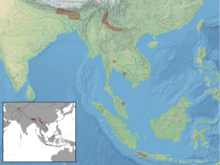The bronze sprite (Arielulus circumdatus),[2] also known as the black-gilded pipistrelle, is a species of vesper bat found in China, India, Myanmar, and Nepal.
| Bronze sprite | |
|---|---|

| |
| Scientific classification | |
| Domain: | Eukaryota |
| Kingdom: | Animalia |
| Phylum: | Chordata |
| Class: | Mammalia |
| Order: | Chiroptera |
| Family: | Vespertilionidae |
| Genus: | Arielulus |
| Species: | A. circumdatus
|
| Binomial name | |
| Arielulus circumdatus (Temminck, 1840)
| |

| |
| Synonyms | |
| |
Taxonomy edit
The bronze sprite was described as a new species in 1840 by Dutch zoologist Coenraad Jacob Temminck, who placed it in the genus Vespertilio with a scientific name of Vespertilio circumdatus.[3]
Description edit
Its forearm length is 41–44 mm (1.6–1.7 in). The fur of its back is black with some hairs tipped in orange. Its belly fur is paler than its back and brown.[4]
Range and habitat edit
The bronze sprite is found in South and Southeast Asia, including the following countries: Cambodia, China, India, Indonesia, Malaysia, Myanmar, Nepal, Thailand, and Vietnam. It has been documented at a range of elevations from 1,300–2,100 m (4,300–6,900 ft) above sea level.[1]
Conservation edit
As of 2019, the bronze sprite is evaluated as a least-concern species by the IUCN. It meets the criteria for this designation due to its large geographic range, and thus, presumably large population. Additionally, it is not thought to be experiencing rapid population decline.[1]
References edit
- ^ a b c Bates, P.; Bumrungsri, S.; Francis, C.; Csorba, G.; Walston, J.; Molur, S.; Srinivasulu, C.; Kruskop, S.V. (2019). "Arielulus circumdatus". IUCN Red List of Threatened Species. 2019: e.T41534A22005596. doi:10.2305/IUCN.UK.2019-3.RLTS.T41534A22005596.en.
- ^ "Explore the Database". mammaldiversity.org. Retrieved 14 September 2021.
- ^ Temminck, C. J. (1840). Monographies de mammalogie, ou Description de quelques genres de mammifères, dont les espèces ont été observées dans les différens musées de l'Europe [Monographs of mammalogy, or Description of some kinds of mammals, whose species have been observed in the different museums of Europe] (in French). Vol. 2. Paris. pp. 223–224.
- ^ Smith, Andrew T.; Xie, Yan; Hoffmann, Robert S.; Lunde, Darrin; MacKinnon, John; Wilson, Don E.; Wozencraft, W. Chris, eds. (2010). A Guide to the Mammals of China. Princeton University Press. pp. 355–356. ISBN 9781400834112.
